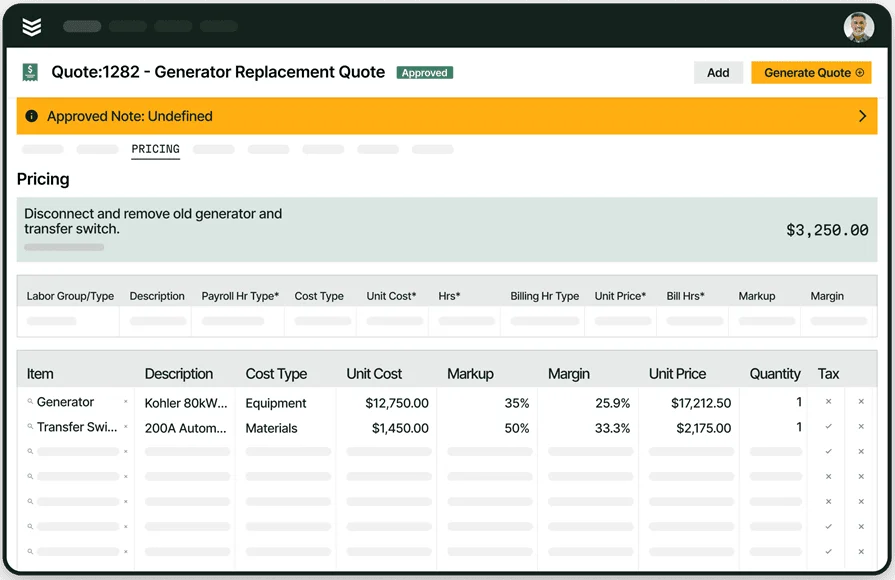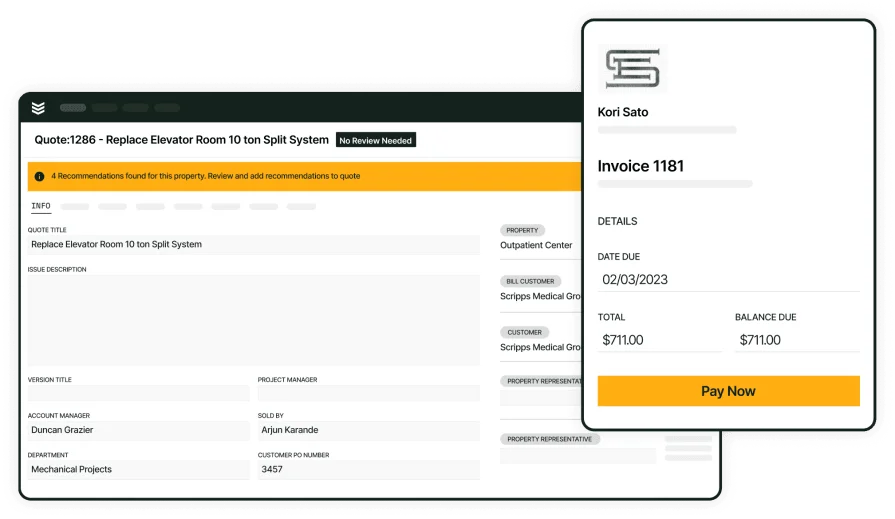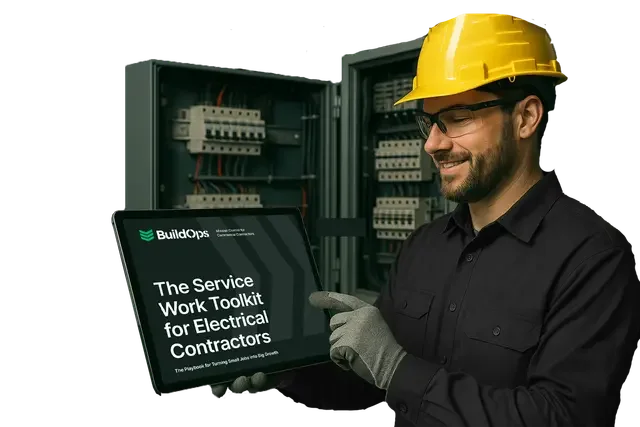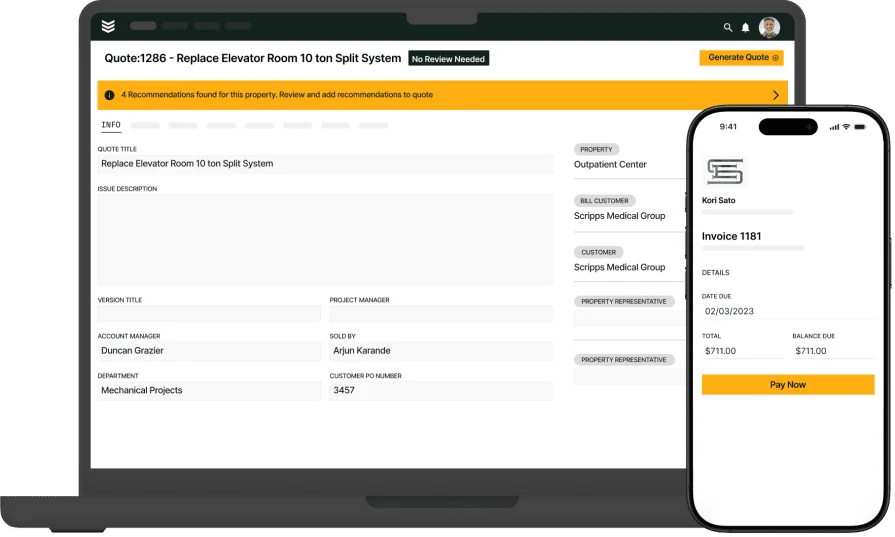Handling estimates as a small electrical contractor can feel like a juggling act. Between takeoffs, pricing materials, managing subs, and trying to lock in bids before the competition, every minute counts. Without solid estimating software, mistakes pile up, jobs slip through your fingers, and profits get squeezed.
This guide breaks down what small electrical contractors need to know about choosing the best electrical estimating software for small contractors. We’ll cover key features, leading tools, real-world benefits, and common questions—all focused on helping you run tighter, faster estimates without the chaos. And if you're looking for tools that fit your needs as part of the larger electrical industry, this guide will help point you in the right direction.
- Why is electrical estimating software important for small contractors?
- Choosing the right electrical estimating software for your small business
- 6 key features to look for in electrical estimating software for small contractors
- 8 best electrical estimating software for small contractors
- 7 benefits of using electrical estimating software for small contractors
- 4 important electrical estimating software FAQs answered for small contractors
When you’re a small electrical shop, every bid you send out carries real weight. One wrong number or missed detail can cost the job—or worse, eat into your profit after the fact. The best electrical estimating software for small contractors helps eliminate guesswork, tighten up pricing, and win jobs with confidence. Let’s start with why reliable estimating software matters so much when you're running lean crews and chasing tight deadlines.
Why is electrical estimating software important for small contractors?
Small electrical contractors don’t have time for bid mistakes. When estimating is handled manually, across spreadsheets, or rushed between site visits, key details get skipped, material costs shift, and labor hours go untracked. Jobs get lost, profit margins shrink, and costly rework eats into thin schedules.
Electrical estimating software ties your entire bidding process into one system. You can create accurate takeoffs, update pricing, track labor, and build detailed proposals without bouncing between tools. It helps you lock in competitive bids faster, avoid costly errors, and protect your margins. That means less stress for your team and stronger cash flow from job to job.
Choosing the right electrical estimating software for your small business
Small electrical contractors and their technicians rely heavily on fast, accurate estimates while working jobs in the field. Every quote needs to be tight enough to stay competitive but detailed enough to protect profit. Choosing the best electrical estimating software for small contractors means finding a system that fits how your crew actually works, without adding more headaches or slowing down your process.
Before you commit to any platform, ask these key questions to make sure the software supports your real-world estimating needs:
- Workflow fit – Can the software handle field-based estimating when techs are on-site? Can it generate quick takeoffs for both simple service calls and larger installations? Does it allow technicians to adjust pricing on the spot if material costs shift during a job?
- Ease of use – Can your estimators and techs learn it fast without spending hours in training? Does it work smoothly on mobile devices so crews can build estimates right from the jobsite? Are templates and item databases easy to search and update in the field?
- Support and reliability – If something glitches during a time-sensitive bid, is support easy to reach? Does the system stay stable during heavy estimating periods? Are there regular updates that keep pace with code changes and supplier pricing?
- Scalability – As your shop grows, can the software handle extra estimators, bigger project files, and more complex bidding requirements? Will it keep pace as you expand into larger contracts or commercial work?
- Features – Does it include the tools you’ll actually use? Look for features like built-in assemblies, material pricing updates, labor hour calculations, supplier integration, proposal generation, and job cost forecasting. Will it help you turn accurate bids faster without needing extra software?
Once you’ve worked through these questions, the next step is narrowing down which features will keep your estimating tight, your bids competitive, and your margins protected as your electrical business grows.
6 key features to look for in electrical estimating software for small contractors
Techs and estimators are often building bids right from the job site while balancing incoming calls, scheduling demands, and changing material prices. The best electrical estimating software for small contractors needs to fit directly into that workflow—helping you produce accurate estimates quickly, whether you’re in the office or standing in front of a breaker panel.
Here’s a breakdown of the features that make the difference when every estimate can decide whether you land the job or lose it.
1. Scheduling and dispatch integration
An estimating software that connects with your field service scheduling and dispatch management helps you coordinate job site visits for estimates without playing phone tag. You can assign estimators based on availability, location, and skillset to ensure fast, accurate site walks.
For instance, a small electrical crew gets a last-minute request for a commercial lighting retrofit. Instead of calling around, the office sees which estimator is free, sends the job details to their mobile app, and routes them straight to the site. The estimate gets done that same afternoon, giving you a better shot at winning the job before competitors even show up.
2. Quoting and proposal generation
The best electrical estimating software for small contractors simplifies proposal creation with built-in quoting tools that automatically pull in labor, materials, and pricing data. This reduces errors and saves time, especially when jobs require quick turnarounds.
Say a residential customer asks for a service upgrade while you're already replacing outlets. Instead of delaying, your technician uses the quoting tool on-site, pulls up the correct panel replacement package, and presents the quote immediately. The homeowner signs off, and your crew starts the work that same day.
3. Real-time material pricing and supplier integration
Electrical material costs change fast. With integrated supplier data, pricing updates directly inside the estimating software, keeping your bids accurate and profitable without manual updates.
Take for example a small contractor bidding on multiple EV charger installations. While preparing estimates, the system flags a price increase on conduit and breaker panels from one supplier but suggests a better current price from another vendor. Your estimator adjusts instantly, keeping the bid sharp without eating into your profit.
4. Mobile estimating for field technicians
Having technician mobile access allows field techs to build or adjust estimates on the spot while walking a jobsite. No more scribbled notes or guessing later in the office.
Consider a tech evaluating a retail tenant improvement job. During the walkthrough, they uncover outdated wiring behind the walls. Instead of delaying the estimate, the tech updates labor hours, adds new materials, and finalizes the revised bid—all directly from the tablet while still on-site.
5. CRM and pipeline visibility
With built-in pipeline management and CRM functionality, you can track open bids, follow up on outstanding quotes, and avoid letting potential projects slip through the cracks.
Think about those multi-unit apartment projects you’ve bid on. Your office staff sees exactly where each bid stands, follows up before the customer awards the job, and stays ahead of closing deadlines. No more forgotten quotes sitting idle while your competition moves in.
6. Job costing and reporting
Accurate job costing through reporting tools helps small contractors learn from past estimates, refine labor assumptions, and tighten future bids. You can compare actual vs. estimated costs and make smarter pricing decisions.
For example, after completing several generator installations, you realize labor hours are consistently running higher than your initial estimates. The reporting shows exactly where you’ve been underbidding. Now, your estimators adjust future bids based on real labor history, protecting your profit on every job.

Estimate better. Quote faster.
See how we help electrical contractors integrate quoting and field workflows.
Other notable features to look for in electrical estimating software
While the core estimating features handle most of the heavy lifting, small electrical contractors can benefit from additional tools that bring extra efficiency, accuracy, and visibility to the business. These features help sharpen your operations without overwhelming your estimating process.
- Service agreements – Managing recurring maintenance contracts and warranty work becomes much easier with built-in service agreement tools. You can schedule future service dates, automatically generate work orders, and ensure contract work is never missed.
- Invoicing and payments – Once a job moves from estimate to completion, integrated invoicing software and payment processing help you send invoices quickly, accept customer payments, track receivables, and keep your cash flow steady without delays or follow-ups.
- Fleet management – Stay in control of your service vehicles with fleet tracking features. Monitor vehicle locations, track mileage, and schedule routine maintenance to reduce downtime and optimize routing for your estimating and service calls.
- Time tracking and payroll – Accurately capture labor hours through time tracking tools that feed directly into job costing, payroll, and future estimating calculations. This keeps your labor numbers sharp for every bid you create.
Once you’ve locked in the must-have features, it’s time to look at which platforms deliver the best electrical estimating software for small contractors in the real world.
8 best electrical estimating software for small contractors
Finding the best electrical estimating software for small contractors depends on how you handle job volume, material pricing, client requests, and field technician input. Some platforms serve larger commercial contractors, while others cater to small field service shops that need fast, simple estimating without unnecessary complexity. This list covers eight strong options small electrical contractors are using to generate accurate estimates, win bids, and keep jobs moving.
When you’re running a small electrical shop, finding the best electrical estimating software for small contractors comes down to speed, accuracy, and how well it fits the way your crew works. Some platforms offer deep estimating tools made for larger commercial teams. Others keep it simple for small contractors who need to price jobs, build estimates, and keep projects moving without getting buried in complicated features.
Below are eight options contractors are using to keep their bids sharp and their teams efficient.
1. Best for commercial: BuildOps
BuildOps offers a full platform built specifically for commercial electrical contractors who need everything from estimating to scheduling under one roof. The software makes it easy to pull material lists, labor rates, supplier pricing, and assemblies right into the estimate—cutting down guesswork and saving hours on every bid.
It also links directly into your scheduling, dispatching, and invoicing so that once the estimate is approved, the job gets rolling fast. For very small contractors focused solely on residential service work, some of the commercial features may feel like overkill.
How Pricing Works: BuildOps offers customized pricing based on team size, features, and scope of work, giving small contractors flexibility as they grow.
Features Beyond Estimating: Real-time scheduling, dispatch boards, mobile field access, service agreement management, CRM tools, invoicing, payments, and full reporting.
What Sets It Apart for Small Electrical Contractors: BuildOps ties estimating directly into your full job cycle, letting your office and field teams stay synced from quote to closeout without juggling multiple systems.

Estimate accurately and cut costs
We help small electrical contractors tighten up estimating and land more jobs.
2. Best for residential: Housecall Pro
Image Source: Housecall Pro
Housecall Pro fits small residential electrical contractors handling service calls, panel upgrades, and quick installations. The system allows you to send estimates, schedule work, and collect payments through a simple app interface. It’s great for one-truck shops and growing team, but may not support complex commercial estimating or detailed assemblies as your projects scale up.
How Pricing Works: Monthly pricing starts affordably for small teams, with upgraded tiers available for additional users and expanded features.
Features Beyond Estimating: Customer reminders, automated job confirmations, online booking tools, integrated payments, and review requests.
What Sets It Apart for Small Electrical Contractors: Housecall Pro keeps residential jobs simple and efficient, helping contractors move from quote to payment without extra admin steps or delays.
But How Does It Compare To BuildOps? Find out in our feature comparison of Housecall Pro vs BuildOps.
3. Best for general contractors: Jobber
Image Source: Jobber
Jobber works for general contractors managing a variety of small service jobs, including light electrical estimating. The system allows you to build simple quotes, track job status, and manage schedules through a mobile dashboard. But for electrical contractors needing detailed material assemblies, complex takeoffs, or supplier integration, Jobber may lack the estimating depth required for bigger jobs.
How Pricing Works: Plans start at $29/month for up to five users, with additional pricing for larger teams and feature upgrades.
Features Beyond Estimating: Batch billing, automatic payment reminders, drag-and-drop job scheduling, real-time field updates, and customer record management.
What Sets It Apart for Small Electrical Contractors: Jobber gives small teams an easy way to price basic jobs and keep their schedules organized, without requiring complex training or extra admin overhead.
4. Best for solo contractors: Joist
Image Source: Joist
Joist works well for solo electricians or very small shops who need to turn around quick estimates on-site without complicated tools. Its mobile-first design allows you to build estimates while standing at the panel or walking the property, then send professional-looking proposals right to the customer. However, if you're pricing larger commercial jobs or need detailed assemblies, Joist lacks the depth many growing electrical contractors require.
How Pricing Works: Joist offers both a free basic version and paid plans that unlock expanded features like QuickBooks syncing, advanced reporting, and custom branding.
Features Beyond Estimating: Client management, digital signatures, mobile invoicing, and basic payment tracking.
What Sets It Apart for Small Electrical Contractors: Joist is perfect for one-person operations needing simple, fast estimating that looks professional without requiring a lot of setup or training.
5. Best for ease of use: GorillaDesk
Image Source: GorillaDesk
GorillaDesk appeals to small service businesses needing a very simple platform that offers light estimating along with job scheduling. It’s great for basic electrical estimating where you’re dealing with small installs or repairs. But for contractors who require detailed parts lists, labor assemblies, or supplier pricing integration, GorillaDesk's estimating features may feel too limited.
How Pricing Works: GorillaDesk uses a user- and route-based pricing model with affordable monthly fees that increase as your team expands.
Features Beyond Estimating: Route planning, mobile job updates, customer management, invoicing, and credit card processing.
What Sets It Apart for Small Electrical Contractors: GorillaDesk helps small shops build quick service estimates and assign work orders easily, making it a good fit for simple residential and maintenance work.
6. Best for growing businesses: Fergus
Image Source: Fergus
Fergus supports small electrical contractors looking to step into larger projects while maintaining tight control over estimates. The software lets you break down projects by labor, materials, and phases, giving better visibility into job profitability before the work even starts. As you grow into bigger commercial jobs, though, its estimating tools may lack the depth that larger, more specialized platforms provide.
How Pricing Works: Plans start around $40 per user monthly, with more advanced features available on higher-tier subscriptions.
Features Beyond Estimating: Visual scheduling boards, project costing, job tracking, quoting tools, time tracking, and profit forecasting.
What Sets It Apart for Small Electrical Contractors: Fergus helps small crews build smarter estimates as they take on bigger jobs, offering better visibility into profit margins and resource planning.
7. Best for full-service specialty contractors: Service Fusion
Image Source: Service Fusion
Service Fusion brings estimating together with dispatch, job tracking, and field communication tools for contractors juggling multiple jobs and crews. Estimates can be built quickly with built-in templates, and then flow directly into job orders once approved. But for very small contractors focused on simple service work, Service Fusion may offer more features than they need.
How Pricing Works: Flat-rate pricing starts around $125/month, covering unlimited users and providing full access to its toolset.
Features Beyond Estimating: GPS fleet tracking, estimate approvals, call recording, recurring job management, and QuickBooks integration.
What Sets It Apart for Small Electrical Contractors: Service Fusion gives growing teams an all-in-one platform to handle estimates and field operations without adding multiple disconnected apps.
8. Best for team communication: Kickserv
Image Source: Kickserv
Kickserv helps small electrical contractors manage estimating alongside customer communication, job updates, and team coordination. Its estimating feature allows for simple quoting, while customer self-service portals and internal messaging keep everyone on the same page. Contractors who need advanced estimating with supplier pricing or detailed labor assemblies may find its estimating functions too basic.
How Pricing Works: Kickserv offers both free and paid plans, with paid tiers starting at $59/month depending on features and user count.
Features Beyond Estimating: Customer portals, job notes, online approvals, internal messaging, and follow-up reminders.
What Sets It Apart for Small Electrical Contractors: Kickserv helps smaller shops combine simple estimating with team communication and job tracking, minimizing miscommunication between office staff, field techs, and customers.

Level up your estimating
Access leading strategies, real-life examples, and pre-built templates.
7 benefits of using electrical estimating software for small contractors
For small electrical contractors, estimating software becomes the foundation for profitability. It’s not only about producing faster quotes — it’s about protecting margins, reducing rework, and giving crews the clarity they need before any wire gets pulled.
1. Faster bid turnaround and better win rates
In electrical contracting, response time often decides who wins the job. Estimating software allows small contractors to build detailed, itemized quotes in hours instead of days. Templates for common services, pre-loaded labor rates, and real-time material costs help eliminate the back-and-forth that slows down bids. With electrical bidding apps, your estimators or techs can build full quotes while standing on-site — giving customers pricing before your competitors even respond.
2. Stronger customer relationships and bid follow-up
Losing track of estimates after they’re sent can quietly kill your closing rate. The best estimating software often integrates directly with CRM for electrical contractors, helping small contractors track open bids, schedule automatic follow-ups, and nurture repeat customers. It keeps every opportunity in view, so no potential job slips through the cracks.
3. Smarter labor and material forecasting
Every missed labor hour or underquoted material cost chips away at your profit. Estimating software helps contractors break jobs into phases, accurately calculate time on site, and apply correct material takeoffs upfront. As you build historical data, some platforms even incorporate AI-powered electrical estimating tools to suggest labor benchmarks based on your past projects.
4. Seamless transition from bid to dispatch
When an estimate gets approved, the software can immediately push job details into dispatching. This eliminates redundant data entry, speeds up scheduling, and ensures crews have the exact scope they were quoted. Tightly integrated electrical dispatch software helps small teams get techs on-site quickly with full estimate visibility.
5. Cleaner invoicing that matches quoted work
Billing disputes usually come from differences between quoted work and final invoices. When estimating software connects directly with electrical contractor invoicing tools, invoices are automatically built from the approved quote. That means no missed line items, no forgotten labor charges, and faster payments from satisfied customers.
6. Better oversight on active projects
Estimating software with built-in electrical contractor project management allows you to track how jobs are performing against the original bid as work progresses. You’ll spot overruns sooner, adjust before losses pile up, and tighten your estimating accuracy for future jobs based on real field data.
7. Long-term profitability through data-driven estimating
Over time, the best electrical estimating software for small contractors builds a database of actual job costs, vendor pricing trends, and labor productivity. This historical insight allows contractors to fine-tune every future bid with greater confidence, protecting profits even as material markets shift or job scopes change unexpectedly.
4 important electrical estimating software FAQs answered for small contractors
If you’re running a small electrical shop, choosing the best electrical estimating software for small contractors raises plenty of questions. You want to know how it works out in the field, what features actually help your estimating process, and whether it's worth the investment when you’re quoting jobs every day. Below, we break down the most common concerns small electrical contractors face when selecting estimating software, with answers that speak directly to field service work.
1. What is electrical estimating software?
Electrical estimating software helps small electrical contractors build fast, accurate, and profitable job estimates. Instead of juggling spreadsheets, catalogs, and handwritten notes, the software pulls together labor costs, material pricing, supplier data, and assemblies into one platform.
This gives contractors the ability to price jobs while standing on-site, build detailed quotes for complex installs, and protect profit margins on every bid. Whether your team is quoting small service jobs or full panel replacements, the software ensures pricing is consistent, professional, and ready to turn into scheduled work immediately.
2. What types of small electrical businesses benefit from using estimating software?
This type of software is essential for:
- Residential service electricians
- Light commercial electrical contractors
- Electrical panel and service upgrade contractors
- EV charger installation specialists
- Electrical maintenance providers for property management groups
- Low-voltage and structured cabling contractors
- Any field service electrical contractor bidding multiple jobs weekly
If your team is submitting quotes, managing change orders, or pricing custom installs, estimating software helps you build consistent bids and eliminate pricing gaps that cut into your margins.
Did you know
Our customer Jolma Electric is a great example of what types of businesses can benefit from implementing software. They saw a 50% spike in efficiency after using BuildOps, and you could too.
3. Are there any compliance requirements small contractors should be aware of when using electrical estimating software?
Yes, but most are straightforward if you pick a solid platform. First, your estimating system should calculate applicable sales tax automatically based on your job location. If the software stores client data (addresses, contacts, payment terms), it should comply with privacy laws like CCPA or GDPR. If payments are processed through the software, PCI compliance ensures customer payment info stays secure. For union work or certified payroll jobs, your software should accurately track labor categories and rates based on contract terms.
Always verify that your estimating system can handle any labor or financial reporting tied to your specific type of electrical work.
4. What are the best practices when using electrical estimating software for small electrical contractors?
When you’ve got estimating software in place, these best practices help you get the most out of it:
- Build standardized estimating templates for your most common jobs to reduce rework.
- Keep labor rates updated based on actual crew performance and experience levels.
- Sync real-time material pricing with suppliers to protect your profit margins.
- Use assemblies for multi-part tasks (ex: panel changeouts, lighting retrofits).
- Break complex jobs into phases to better track profitability at each stage.
- Train both field techs and office staff to create or adjust estimates on-site.
- Tie estimates directly into scheduling and dispatch to eliminate duplicate data entry.
- Review job costing reports regularly to compare estimated vs. actual labor and materials.
- Use CRM integrations to follow up on open quotes automatically.
- Always review software updates—new features often streamline estimating even further.
For small electrical contractors, estimating software is no longer a nice-to-have — it’s a core piece of staying profitable, competitive, and organized. It’s not just about building bids faster. The best electrical estimating software for small contractors also helps control labor costs, stay ahead of shifting material prices, and keep your entire operation—from sales to scheduling—running smoothly.
For teams juggling service calls, upgrades, installs, and ongoing maintenance, having one system that ties estimating into your larger field service workflow keeps everyone on the same page and reduces costly errors down the line.
That’s where platforms like BuildOps make a difference. Designed for commercial field service contractors, it combines estimating, dispatch, project management, invoicing, and service agreements into one connected system—allowing smaller teams to handle growing workloads without adding unnecessary complexity.

Explore BuildOps estimating
Explore how we help growing electrical teams tackle day-to-day operations.








